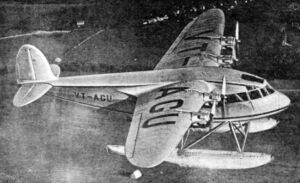Engineering:Short Scion Senior
| S.22 Scion Senior | |
|---|---|

| |
| Role | Transport floatplane |
| Manufacturer | Short Brothers |
| First flight | 1935 |
| Introduction | 1935 |
| Status | Retired |
| Number built | 6 |
| Developed from | Short S.16 Scion |
The Short S.22 Scion Senior was a 1930s United Kingdom four-engined nine-passenger floatplane built by Short Brothers.
Design and development
The Scion Senior was developed as an enlarged version of the Scion light transport for nine passengers. Unfortunately, the aircraft failed to win orders from internal airline operators, who had already adopted the De Havilland Dragon and Dragon Rapide; instead it proved attractive as a seaplane for survey and river transport purposes overseas, and the first order came from the Irrawaddy Flotilla Co. in Burma, with a promise of further orders if the first seaplane proved satisfactory. So the Scion Senior was designed basically as a seaplane with an alternative land chassis. The first two aircraft, built as floatplanes, were shipped to Rangoon as soon as they had received their Certificate of Airworthiness; the third aircraft was built as a landplane for Shorts to use as a demonstrator; the remaining three were built as floatplanes, although one (S.835, G-AENX) was actually first flown as a landplane before being converted to its intended floatplane configuration.[1]
Operational history
The last aircraft built (serial number L9786) was acquired by the Air Ministry for testing flying boat hull designs particularly for the Short Sunderland. Redesignated the Scion Senior FB (for Flying Boat), it was fitted with a duralumin, flush-riveted central float and outrigger floats. During 1942, a series of trials by the Marine Aircraft Experimental Establishment (MAEE) was undertaken, determining attitude and stability characteristics of the design. The sole test example was lost at sea on 15 March 1944 off Helensburgh, Argyll, when an attempt was made to take off from the Clyde in frosty conditions. H.G. White, a Flight Test Officer at MAEE Helenburgh, died when the aircraft stalled into the water and sank. The other two members of the crew were rescued.[2]
The Scion Senior landplane was eventually sold to Palestine Air Transport in December 1938, to be based in Haifa. It was impressed into Royal Air Force service in the Middle East in February 1942 and lost in action on 22 September 1943.
Operators
Floatplane
 British India
British India
- Irrawaddy Flotilla Co Ltd
- Palestine Airways Ltd
- Sierra Leone
- Elders Colonial Airways Ltd
 United Kingdom
United Kingdom
- Air Ministry (MAEE)
- Royal Air Force
- West of Scotland Air Services Ltd
Landplane
 Iraq
Iraq
- Iraq Petroleum Transport Co Ltd
 United Kingdom
United Kingdom
- Jersey Airways Ltd
- Royal Air Force
- Short Brothers (demonstrator)
Specifications (Scion Senior Floatplane)
Data from Shorts Aircraft since 1900[3]
General characteristics
- Crew: 1
- Capacity: 10 passengers[4]
- Length: 42 ft 0 in (12.80 m)
- Wingspan: 55 ft 0 in (16.76 m)
- Wing area: 400 sq ft (37 m2)
- Empty weight: 3,650 lb (1,656 kg)
- Gross weight: 5,750 lb (2,608 kg)
- Fuel capacity: 60 imp gal (72 US gal; 270 L)[5]
- Powerplant: 4 × Pobjoy Niagara III 7-cylinder radial engines, 90 hp (67 kW) each [6]
Performance
- Maximum speed: 134 mph (216 km/h, 116 kn)
- Cruise speed: 115 mph (185 km/h, 100 kn)
- Range: 400 mi (640 km, 350 nmi)
- Service ceiling: 10,000 ft (3,000 m)
- Rate of climb: 650 ft/min (3.3 m/s) [5]
See also
Related development
Related lists
- List of aircraft of the Royal Air Force
References
Notes
- ↑ Barnes and James 1989, p. 298.
- ↑ Test Flying memorial Project web site
- ↑ Barnes 1967, p. 301
- ↑ Barnes 1967, p. 296
- ↑ 5.0 5.1 Flight 31 October 1935, p. 454
- ↑ 6.0 6.1 Jackson 1988, p. 303
Bibliography
- Barnes, C. H. (1967). Shorts Aircraft since 1900. London: Putnam.
- Barnes, C. H.; James, Derek N. (1989). Shorts Aircraft since 1900. London: Putnam. ISBN 0-85177-819-4.
- Green, William (1968). Warplanes of the Second World War, Volume Five: Flying Boats. London: Macdonald & Co. (Publishers) Ltd.. ISBN 0-356-01449-5..
- The Illustrated Encyclopedia of Aircraft (part: 1982–1985). London: Orbis Publishing, 1985.
- Jackson, A. J. (1988). British Civil Aircraft 1919–1972: Volume III. London: Putnam. ISBN 0-85177-818-6.
- "The Short Scion Senior". Flight XXXVIII (1401): 452–455. 31 October 1935. https://www.flightglobal.com/pdfarchive/view/1935/1935%20-2-%200498.html. Retrieved 28 March 2019.
External links
- Short Scion Senior – British Aircraft of World War II
 |



